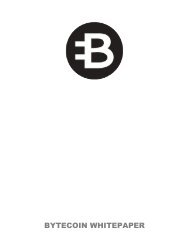Whitepaper - Ripple With Cover
Create successful ePaper yourself
Turn your PDF publications into a flip-book with our unique Google optimized e-Paper software.
allow for rapid convergence and flexibility in network<br />
membership. When taken together, these qualities allow<br />
the <strong>Ripple</strong> Network to function as a fast and low-cost<br />
global payment network with well-understood security<br />
and reliability properties.<br />
While we have shown that the <strong>Ripple</strong> Protocol is<br />
provably secure so long as the bounds described in equations<br />
1 and 3 are met, it is worth noting that these are<br />
maximal bounds, and in practice the network may be<br />
secure under significantly less stringent conditions. It<br />
is also important to recognize, however, that satisfying<br />
these bounds is not inherent to the RPCA itself, but<br />
rather requires management of the UNLs of all users.<br />
The default UNL provided to all users is already sufficient,<br />
but should a user make changes to the UNL, it<br />
must be done with knowledge of the above bounds. In<br />
addition, some monitoring of the global network structure<br />
is required in order to ensure that the bound in<br />
equation 3 is met, and that agreement will always be<br />
satisfied.<br />
We believe the RPCA represents a significant step<br />
forward for distributed payment systems, as the lowlatency<br />
allows for many types of financial transactions<br />
previously made difficult or even impossible with other,<br />
higher latency consensus methods.<br />
[4]<br />
Fischer, Michael J., Nancy A. Lynch, and Michael<br />
S. Paterson. “Impossibility of distributed consensus<br />
with one faulty process.” Journal of the ACM (JACM)<br />
32.2 (1985): 374-382.<br />
[5]<br />
Martin, J-P., and Lorenzo Alvisi. “Fast byzantine<br />
consensus.” Dependable and Secure Computing,<br />
IEEE Transactions on 3.3 (2006): 202-215.<br />
[6]<br />
Alchieri, Eduardo AP, et al. “Byzantine consensus<br />
with unknown participants.” Principles of Distributed<br />
Systems. Springer Berlin Heidelberg, 2008. 22-40.<br />
6. Acknowledgments<br />
<strong>Ripple</strong> Labs would like to acknowledge all of the people<br />
involved in the development of the <strong>Ripple</strong> Protocol<br />
consensus algorithm. Specifically, Arthur Britto, for his<br />
work on transaction sets, Jed McCaleb, for the original<br />
<strong>Ripple</strong> Protocol consensus concept, and David Schwartz,<br />
for his work on the “failure to agree is agreement to defer”<br />
aspect of consensus. <strong>Ripple</strong> Labs would also like to<br />
acknowledge Noah Youngs for his efforts in preparing<br />
and reviewing this paper.<br />
References<br />
[1]<br />
Nakamoto, Satoshi. “Bitcoin: A peer-to-peer electronic<br />
cash system.” Consulted 1.2012 (2008): 28.<br />
[2]<br />
Lamport, Leslie, Robert Shostak, and Marshall<br />
Pease. “The Byzantine generals problem.” ACM<br />
Transactions on Programming Languages and Systems<br />
(TOPLAS) 4.3 (1982): 382-401.<br />
[3]<br />
Attiya, C., D. Dolev, and J. Gill. “Asynchronous<br />
Byzantine Agreement.” Proc. 3rd. Annual ACM<br />
Symposium on Principles of Distributed Computing.<br />
1984.<br />
8

















